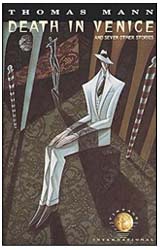Books |
Thomas Mann
By
Published: Oct 31, 2016
Category:
Fiction
“Buddenbrooks” fills 736 pages. “The Magic Mountain” only takes 720. “Doctor Faustus” is brisk at 544 pages. But I didn’t want to face the Lord of Literature at the Library in the Clouds without having read Mann, so I picked up a copy of “Death in Venice and Seven Other Stories” — a snip at 400 pages.
I figured I didn’t need to read all eight stories to get a feel for Mann.
News flash: Three of these eight stories provide the kind of pleasure not regularly available in great literature.
They’re dirty. Hot. Sick.
It’s been ages since I read the title story or saw the great Lucino Visconti film adaptation. Gustav Von Aschenbach is, like Mann, a successful writer who lives and works on a precise, unchanging schedule — and who has varied his routine to take a vacation in Venice. And there he sees Tadzio, a young boy on holiday with his family.
I didn’t know until recently that the idea of the story came from Mann’s sighting of a beautiful boy in Venice. As a scholar (and Head Butler reader) has noted, "Mann fell in love with a boy who wasn’t 15, but 10. Although he didn’t follow the boy all over the city, and nobody died, the book is almost entirely true. It took him a year to write it. Doubtful about whether he should publish it or not, he asked his wife, who said he should indeed."
Is Aschenbach…gay? Too simple. Aschenbach is repressed; indeed, he’s the emblem of a repressed culture. As a writer, he’s a craftsman; as a man, he’s a coward. But now he’s confronted by a “godlike work of art.” And because “passion is like crime,” Aschenbach suddenly revels in the dark, the forbidden — even in the unnamed disease wafting through alleys and killing without mercy. [To buy the paperback of "Death in Venice (and Seven Other Stories)" from Amazon, click here. For the Kindle edition, click here.]
I also commend the film, starring Dirk Bogarde, who often played tormented souls. [To rent or buy the video stream from Amazon, click here.]
Biographical note: Mann worked religiously from 9 until 12:15 every day and produced about 500 words, which he rarely had to change. He composed the next day’s work in his head while taking an hour’s walk with his dog. After a leisurely lunch, he’d have a nap and, after tea, deal with his correspondence. In the evening he would often read aloud from his works, play music on his violin and phonograph, entertain guests, or, driven by his chauffeur, attend a play, concert, or opera.
“Mario and the Magician” is about a magician’s power to make things disappear and transform and surprise, but even more, the showman’s power to hypnotize people and induce them to do things they’d never ordinarily countenance. It’s a parable of the mechanics of Nazism; it’s a textbook demonstration of a demagogue stripping people of their autonomy. And it’s very much about the carnal aspect of that disrespect — we see how that much power twists a humpbacked performer into a sexual predator. When the magician orders Mario to kiss him…
But the sickest of the lot is “The Blood of the Walsungs.” This a rich family, as old European families before World War I could be rich — their days consist of a little business, but more of fine food, cultural expeditions and tedious conversations. Of course their twin children are spoiled. Now nineteen, Siegmund and Sieglinde barely tolerate the best accessories, the highest culture; life gives them many opportunities to be snide. But Siegmund and Sieglinde have each other, and that is all they seem to need; they walk hand in hand, contemptuous of all who can’t join their private club. “They played like puppies,” Mann writes, which sounds innocent enough. But as Sieglinde’s wedding day approaches….
Biographical note: Mann fathered six children. Three were gay. Two committed suicide. Mann and one of his daughters occasionally dressed alike.
Set that aside. These stories not only helped me see why Mann got the Nobel Prize, they showed me why he spoke out early and often against the Nazis, and left Germany, and why he delivered radio speeches condemning Germany to his countrymen during World War II. And, more to the point, why Irwin Shaw, an American master of the short story, had “Buddenbrooks” by his bed as he lay dying.
There are exalted arguments for reading Thomas Mann; as we learned in school, he’s the last Great Writer, a Literary Giant. But that giant was also a man, and, clearly, a conflicted one. We’re not Germans of the old school, we don’t have servants bringing us pre-opera dinners of clear soup, sole and pheasant, but it’s just possible that Mann’s stories might shine some light on our own neglected corners. Or, at least, provide some high-class titillation.
To buy "The Magic Mountain" from Amazon, click here.
To buy "Buddenbrooks" from Amazon, click here.
To buy "Doctor Faustus" from Amazon, click here.


